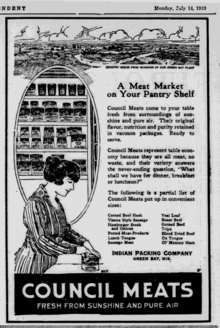| Revision as of 03:17, 6 November 2020 edit2601:600:102:88bb:f07e:87aa:ef02:69d5 (talk)No edit summary← Previous edit |
Revision as of 09:24, 11 January 2021 edit undoMonkbot (talk | contribs)Bots3,695,952 editsm Task 18 (cosmetic): eval 5 templates: hyphenate params (3×);Tag: AWBNext edit → |
| Line 12: |
Line 12: |
|
}} |
|
}} |
|
|
|
|
|
The '''Indian Packing Company''' was a company that was involved in the canned meat industry and was organized in ] on July 22, 1919.<ref name="google1">{{cite book|title=The American Food Journal|date=1921|volume=16|publisher=American Food Journal, Incorporated|issn=0193-1792|url=https://books.google.com/books?id=xhHnAAAAMAAJ&pg=PA41|page=41|accessdate=2015-08-21}}</ref> Its canned meat sold as "Council Meats." When the company was absorbed by the ]-based Acme Packing Company in 1921, it had facilities in ]; ]; ]; and ].<ref> |
|
The '''Indian Packing Company''' was a company that was involved in the canned meat industry and was organized in ] on July 22, 1919.<ref name="google1">{{cite book|title=The American Food Journal|date=1921|volume=16|publisher=American Food Journal, Incorporated|issn=0193-1792|url=https://books.google.com/books?id=xhHnAAAAMAAJ&pg=PA41|page=41|access-date=2015-08-21}}</ref> Its canned meat sold as "Council Meats." When the company was absorbed by the ]-based Acme Packing Company in 1921, it had facilities in ]; ]; ]; and ].<ref> |
|
{{cite news| title = Acme Packers Absorb Another Firm| work =]| date = 1921-01-11| url =https://timesmachine.nytimes.com/timesmachine/1921/01/11/103532735.pdf| accessdate = 2007-11-11}}</ref><ref>{{cite book |last1=Names |first1=Larry D |editor1-first=Greg |editor1-last=Scott |title=The History of the Green Bay Packers: The Lambeau Years |volume=1 |year=1987 |publisher=Angel Press of WI |isbn=0-939995-00-X |page=30 |chapter=The Myth }}</ref> At the time of the sale it was controlled by New England Supply Company of ] with F.P Comstock as its principal owner.<ref name="google1"/> |
|
{{cite news| title = Acme Packers Absorb Another Firm| work =]| date = 1921-01-11| url =https://timesmachine.nytimes.com/timesmachine/1921/01/11/103532735.pdf| access-date = 2007-11-11}}</ref><ref>{{cite book |last1=Names |first1=Larry D |editor1-first=Greg |editor1-last=Scott |title=The History of the Green Bay Packers: The Lambeau Years |volume=1 |year=1987 |publisher=Angel Press of WI |isbn=0-939995-00-X |page=30 |chapter=The Myth }}</ref> At the time of the sale it was controlled by New England Supply Company of ] with F.P Comstock as its principal owner.<ref name="google1"/> |
|
|
|
|
|
Among its slogans were "A meat market on your pantry shelf" and "From the Wisconsin country to you."<ref>{{cite book|url=https://books.google.com/books?id=gKCXAAAAMAAJ&pg=PA480 |title=Official gazette of the United States Patent Office - United States. Patent Office - Google Books |date=2008-10-28 |accessdate=2013-10-16|last1=Patent Office |first1=United States }}</ref> |
|
Among its slogans were "A meat market on your pantry shelf" and "From the Wisconsin country to you."<ref>{{cite book|url=https://books.google.com/books?id=gKCXAAAAMAAJ&pg=PA480 |title=Official gazette of the United States Patent Office - United States. Patent Office - Google Books |date=2008-10-28 |access-date=2013-10-16|last1=Patent Office |first1=United States }}</ref> |
|
|
|
|
|
The Acme Meat Packing Company closed in June, 1943 because of supply shortages related to ]; it did not reopen after the war.<ref>{{cite news|last1=Associated Press|title=Seattle Meat Packers Close|work=Arizona Independent Republic|issue=38|date=June 16, 1943}}</ref> |
|
The Acme Meat Packing Company closed in June, 1943 because of supply shortages related to ]; it did not reopen after the war.<ref>{{cite news|last1=Associated Press|title=Seattle Meat Packers Close|work=Arizona Independent Republic|issue=38|date=June 16, 1943}}</ref> |
Among its slogans were "A meat market on your pantry shelf" and "From the Wisconsin country to you."
The Acme Meat Packing Company closed in June, 1943 because of supply shortages related to World War II; it did not reopen after the war.
